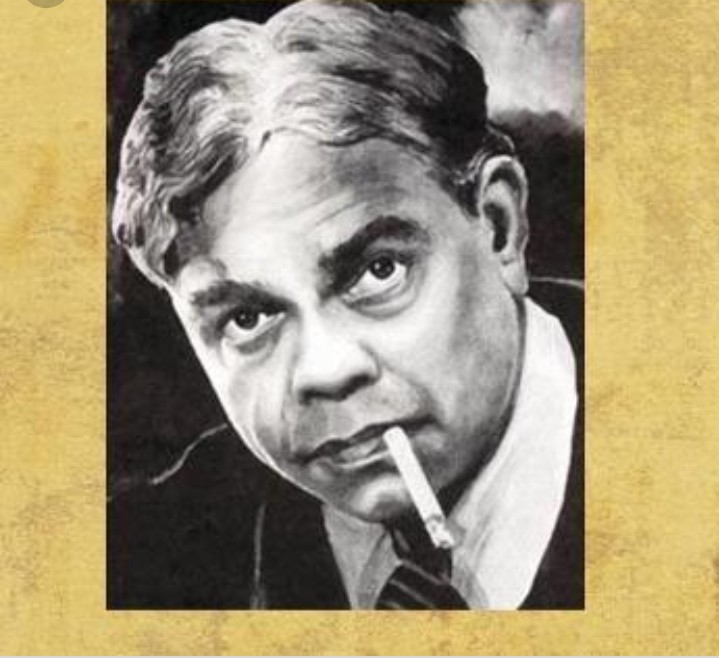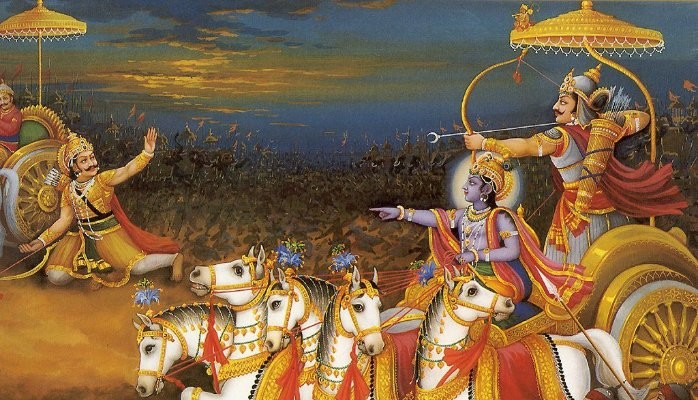Hello, in this blog I will be discussing about the play "The Curse or Karna" by renowned Kannada playwright T. P. Kailasam. This post is crafted as a thinking activity assigned by Megha Madam.
T. P. Kailasam, born on June 4, 1884, in Karnataka, was a famous Indian playwright, poet, and politician. Known for his sharp wit and humor, he contributed greatly to Kannada literature and theater in the early 20th century. His plays often addressed social issues and included political satire. He passed away on September 9, 1946.
The Curse or Karna
The play is divided into five acts and was first published in 1946. It was written with the influence of Sophocles' plays and tells the tragic story of Karna from the Hindu epic, the Mahabharata. Karna is often associated with charity and heroic deeds, and people tend to glorify his character. His role in the Mahabharata is significant, he is an ambiguous figure and a fierce rival of Arjuna. Despite all of this, Karna remains a marginalized and neglected character throughout the Mahabharata's narrative.
Many writers have since sought to highlight such overlooked characters from grand narratives, retelling their stories from different perspectives. Amish Tripathi and Chitra Banerjee are notable examples of such retellings. Similarly, Kailasam places Karna at the center of the narrative, and allows us to see the events of the Mahabharata from his perspective. In this play, we also observe the deconstruction of myth and narrative, as Kailasam portrays Karna's agony and suffering.
Interpret all the acts and scenes in brief.
Karna, an important character in the Mahabharata, was born to Kunti but raised by a charioteer. Although he was a great warrior, he faced rejection because of his low social status. He learned warrior from Parashuram by pretending to be a Brahmin, but was later cursed to forget his skills at a crucial time. Karna was loyal to Duryodhana and fought against the Pandavas in the Kurukshetra war. Despite his courage, the curses and fate led to his defeat by Arjuna. Karna is remembered for his generosity and honor, making him a tragic yet respected hero.
In Act I, we see the Karna is leaving the ashram of Raama (Parshurama). He is originally a Kshatriya, disguised himself as a Brahmin to learn battle tactics under the strict Brahmin teacher Parashuram. He excelled as a student, mastering divine weapons and archery. One day, while Karna was with Parashuram, a bee stung him, causing immense pain. Karna endured silently to not disturb his guru, but when Parashuram saw the blood, he realized Karna's true identity. Angered by the deception, Parashuram cursed Karna that he would forget his divine weapon skills when he needed them most in battle. This curse later played a crucial role in Karna's fate during his duel with Arjuna. This major incident of Brahmin's curse is covered in the first act. And the act ends with the lines.
POOR KARNA...POOR...POOR KARNA.
ACT II
This act opens in the royal stadium at the Hastinapur. Both Karna and Arjuna are facing off with each other and shows their prowess of archery. In this also Karna has to face several discrimination because of his lowly birth at the hand of Bheemasen.
Act III
The Paanchaala Princess is holding a contest for suitors to win her hand by shooting at a target's shadow. Karna, also called Anga, impresses everyone by easily bending a steel bar into a bow. But when the Princess finds out he comes from a low background, she angrily says she can't marry a "sootha’s son." Hurt and embarrassed, Karna freezes and then leaves the contest. This shows the conflict between his great skills and the prejudices of society. The scene highlights themes of pride, shame, and how social status affects people.
Act IV
This scene takes place in Karna's tent on the battlefield of Kurukshetra. It reflects on the aftermath of Draupadi's humiliation during the dice game, but with a new twist. Karna tries to defend Draupadi but can't because of a curse placed on him, showing his noble character despite past conflicts.
Draupadi gives a powerful speech, calling herself a "flame of hate" born to destroy the Kuru family. The scene gives the complicated relationships between the characters from the Mahabharata, especially between Karna and Bhima. It ends with a touching moment where Bhima understands Karna's true nobility and the sadness of his situation. This moment hints at the eventual downfall of the Kuru dynasty and emphasizes the moral complexities of the characters in the epic.
Act V
On the battlefield, Anga and Maadra are tense, with Maadra urging Anga to start the fight. Anga realizes he has been more focused on his skills than his duty to the Emperor. Despite Maadra's advice to aim for Arjuna's chest, Anga hesitates, remembering how Krishna saved Arjuna before. Frustrated, he refuses to use his serpent arrow again and instead declares his intention to defeat the enemy with a simple blade of grass, which worries Maadra about Anga’s mental state.
As the battle continues, Krishna pushes Arjuna to use his powerful arrow to finish it. Although Arjuna feels torn about attacking an unarmed foe, he decides to aim at Anga, tears in his eyes. He shoots an arrow that fatally strikes Anga, leading to sorrow and anger from Maadra and Aswattha. As Anga dies, he reflects on the curses that have followed him, while Maadra and Aswattha grieve their lost friend.
{I have taken help of chatbots to interpret these Acts}
Various themes found in “The Curse”.
Class Conflict and Caste
The foremost theme of the play is class conflict, particularly between Karna and other characters. The first instance of this class conflict occurs at the very beginning when Raama curses Karna for not being of the Brahmin caste, despite having acquired warfare skills from him. Subsequently, Karna is humiliated for being born into the lower "Shudra" caste. Panchalee, the princess, also insults Karna in front of many people during the royal court. Throughout the narrative, Karna suffers simply because he is neither Kshatriya nor Brahmin by birth. The term "Shudra" is occurs throughout the play, highlighting how his implied identity affects him in various areas, such as education, marriage, and most prominently, royal lineage.
Curse
The story of Karna revolves around various curses in the play and in the actual Mahabharata narrative. It begins with the Brahmin's curse that, whenever he is in need of his archery prowess, he will be unable to use it on the battlefield. Moreover, he is also deceived by God Indra, who comes in disguise as a Brahmin and requests Karna's armor, his ultimate protector. Karna must give it up because he is cursed by Mother Earth to fulfill any favor asked of him early in the morning. If we were to remove all the curses from Karna's life, his circumstances would be vastly different.
Friendship
One key theme in the play is friendship. Karna first meets Duryodhana during archery lessons in Hastinapura, where they are competing against Arjuna. Duryodhana sees Karna as a strong rival to Arjuna and wants to befriend him to weaken the Pandavas. When it’s time for Karna to announce his lineage, Duryodhana steps in to say that Karna is a king, offering him the title of King of Angas so he can compete with Arjuna. Karna accepts the title and becomes a loyal friend to Duryodhana, who asks for his "endless friendship" in return. This marks the beginning of their strong bond in the Mahabharata.
"it is but my king I may think of none else
O mother mine, as I die promise thee"
Even in the time of the revelation that he is one of the brother of Pandva that he is their brother, Karna does not betray him.
Destiny
"Hate me...almost hate me? kill me?
almost kill me? slay me? almost slay me
why ever for? what ever have I done to you?
The quote expresses Karna's profound confusion and sense of injustice regarding the hatred and suffering he faces. He questions why he deserves such animosity, highlighting his feelings of alienation and the unfairness of his situation, particularly the curses that stripped him of his skills at crucial moments.
It also reflects his fatalistic acceptance of his tragic fate. The repetition of phrases about killing and slaying underscores his awareness of impending doom, illustrating his struggle with identity and loyalty as he navigates the complexities of his life and ultimately faces his destiny in battle.
Here you can watch the introductory presentation on this topic
Thank you for visiting...









